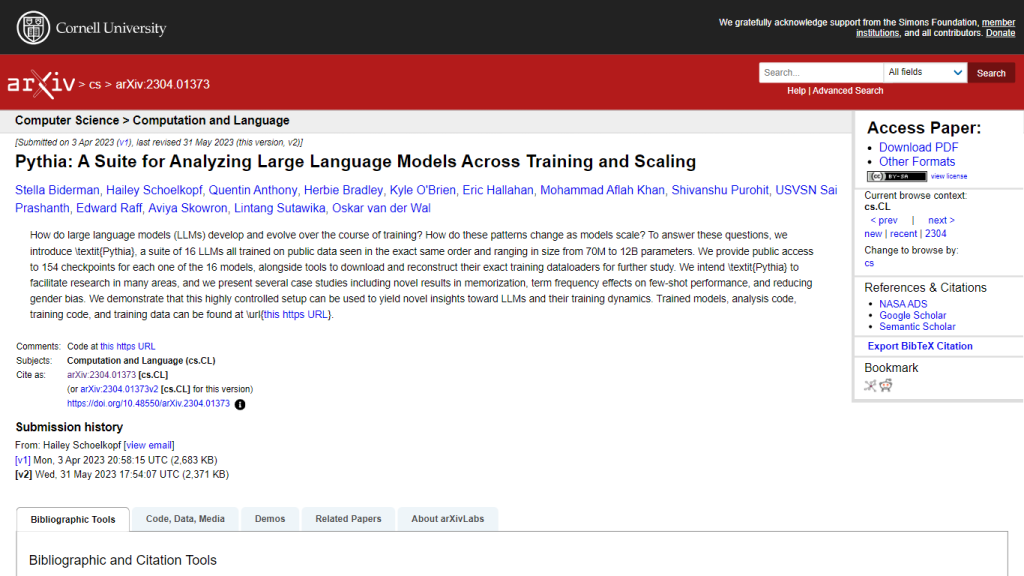What is Pythia?
Pythia is a comprehensive suite of tools designed for the analysis and scaling of large language models (LLMs). It includes 16 different models, each trained with public data in a consistent order. These models vary in size from 70 million to 12 billion parameters. Pythia provides public access to 154 checkpoints per model, along with tools to reproduce training data loaders, making it an invaluable resource for in-depth research. Its primary goal is to support various research domains by offering case studies on topics such as memorization, the impact of term frequency on few-shot learning, and strategies for mitigating gender bias. All components of Pythia, including trained models, analysis code, training code, and data, are accessible via its GitHub repository.
Pythia’s Key Features & Benefits
- Suite for Analysis: A comprehensive set of tools for conducting research on LLM training and scaling.
- Size Variety: Models ranging from 70M to 12B parameters, providing insights across different model scales.
- Public Checkpoints: Access to 154 checkpoints for each of the 16 LLMs.
- Research Facilitation: Tools and code for reconstructing training data loaders to promote further study in the field.
- Case Studies: Presentation of case studies including findings in memorization, few-shot performance, and bias reduction.
The primary benefits of using Pythia include gaining unique insights into the training dynamics of LLMs, the ability to conduct comprehensive research, and access to a controlled environment for studying various aspects of language model training and performance.
Pythia’s Use Cases and Applications
Pythia can be used in a variety of research scenarios. Specific examples include:
- Studying the memorization capabilities of LLMs.
- Analyzing the effects of term frequency on few-shot learning performance.
- Exploring strategies to mitigate gender bias in language models.
Industries and sectors that can benefit from Pythia include academic research, AI development companies, and organizations focused on ethical AI and bias reduction. Case studies provided within the Pythia suite offer real-world examples of its applications and the insights gained from its use.
How to Use Pythia
To use Pythia, follow these steps:
- Access the Pythia suite on GitHub.
- Download the trained models, analysis code, training code, and data.
- Reconstruct the training data loaders using the provided tools.
- Utilize the checkpoints and models for your specific research needs.
For best practices, it is recommended to familiarize yourself with the documentation and case studies available in the suite. The user interface is primarily GitHub-based, making it essential to have a basic understanding of navigating repositories and running code from these environments.
How Pythia Works
Pythia’s underlying technology is built around large language models trained on public data. The models are trained in a consistent sequence, which allows for controlled experimentation and analysis. The suite provides 154 checkpoints per model, enabling researchers to examine the training process at various stages.
The algorithms and models used in Pythia are designed to facilitate research on key topics such as memorization, term frequency effects, and bias reduction. The workflow typically involves downloading the relevant components from GitHub, reconstructing the training data loaders, and conducting experiments or analyses using the provided tools and checkpoints.
Pythia Pros and Cons
Advantages:
- Extensive suite of tools for LLM research.
- Wide range of model sizes, offering diverse insights.
- Public access to checkpoints and training data loaders.
- Support for studying important topics like memorization and bias reduction.
Potential Drawbacks:
- Requires technical expertise to navigate and use effectively.
- Dependence on public data may limit certain types of research.
User feedback generally highlights the suite’s comprehensive nature and its utility in advancing LLM research. However, some users note the steep learning curve associated with utilizing the tools effectively.
Pythia Pricing
Pythia operates on a freemium model, providing access to its suite of tools and resources at no cost. This makes it an accessible option for researchers and organizations looking to explore LLM training dynamics without significant financial investment.
Conclusion about Pythia
In summary, Pythia offers a robust and comprehensive suite for analyzing the development and scaling of large language models. Its range of models, public checkpoints, and research facilitation tools make it an invaluable resource for advancing our understanding of LLMs. While it requires a certain level of technical expertise, the insights gained from using Pythia can significantly contribute to various research domains. As AI and LLM research continue to evolve, Pythia is poised to remain a critical tool in the field.
Pythia FAQs
- What is Pythia?
- Pythia is a suite of 16 different large language models trained on public data in the exact same sequence, with sizes from 70M to 12B parameters.
- Where can I access the Pythia trained models and related tools?
- You can find the trained models, analysis code, training code, and training data on GitHub at the provided URL within the website content.
- What is the purpose of the Pythia suite?
- The purpose of Pythia is to facilitate research across various areas concerning the training dynamics and scaling of large language models.
- What topics can researchers explore with Pythia?
- Researchers can study memorization in LLMs, the effects of term frequency on few-shot performance, and strategies to reduce gender bias, among other aspects.
- How many checkpoints does Pythia provide for each model?
- There are 154 checkpoints available for each of the 16 models included in the Pythia suite.










